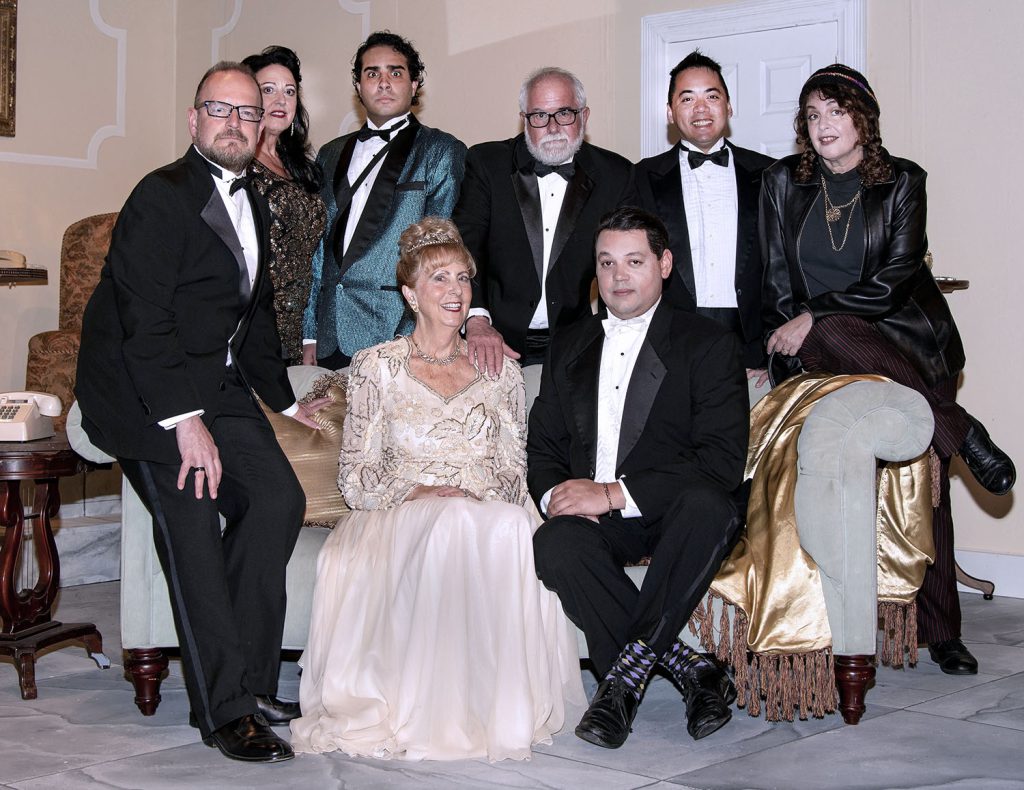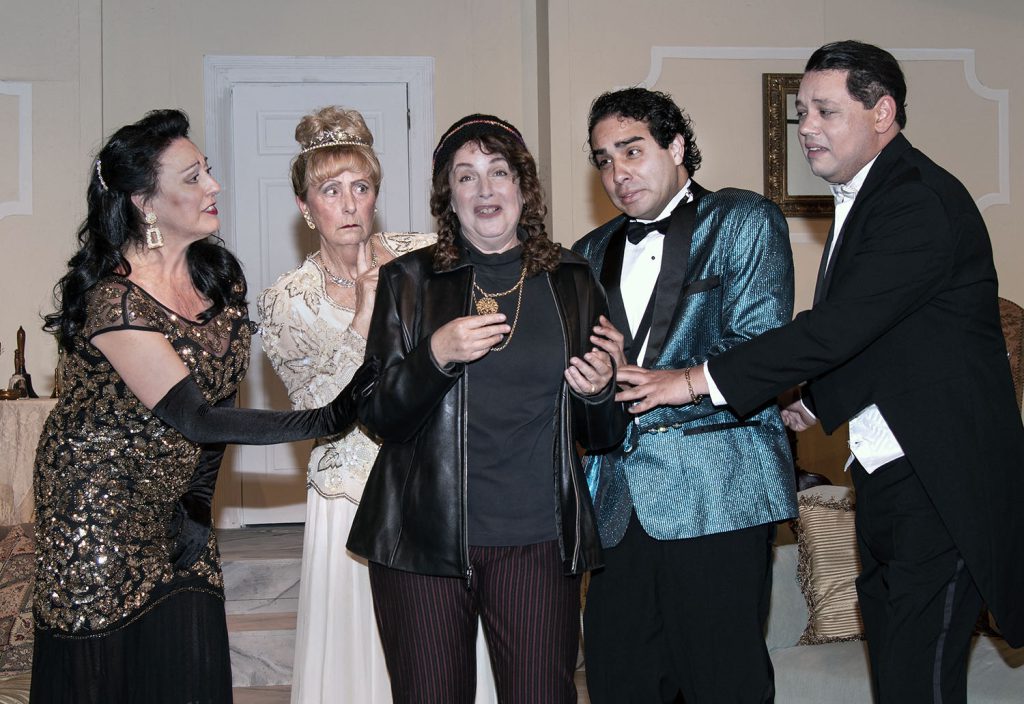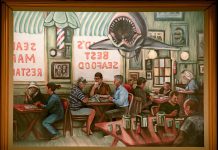By Eric Marchese | Special to the NB Indy
“It’s Only a Play” is something of a rarity for Terrence McNally. Having been a playwright for more than 20 years, he was just on the cusp of finding his voice with searing, incisive works like “The Lisbon Traviata,” “Lips Together, Teeth Apart,” “Master Class” and “Love! Valour! Compassion!” and the librettos for epic musicals like “Kiss of the Spider Woman,” “Ragtime” and “The Full Monty.”
So visit Newport Theatre Arts Center through June 19 and take a look at this fairly obscure comedy, in which McNally overhauled and retitled his unsuccessful 1978 play “Broadway.”
“It’s Only a Play” opened off-off-Broadway in 1982, was revived off-Broadway in 1985 and made it to Broadway in 1986.
The show has rarely been seen in Orange County, which is a bit puzzling, as its subject is something anyone and everyone involved with theater can relate to: the trials and tribulations of staging a new play.

In this case, the (fictional) world premiere is unfolding within the high-stakes realm of getting an all-new (also fictional) play, “The Golden Egg,” off the ground on Broadway. That show has just had its opening-night performance, and its producer, Julia Budder (Yvonne Robertson), is throwing a huge party at her luxurious Manhattan townhouse.
Most of the attendees are celebs of stage and screen, but for Julia and the core group connected with their new show, the issue is how the show will be received by the press, whose first-night reviews can all but make or break any new production.
Among Julia’s guests are the playwright, Peter Austin (Austin James Duffis); director Frank Finger (Alex Piper); and its star, Virginia Noyes (Della Lisi Kerr), each in a state of creative stasis and desperate for hit.
Essentially rooting for the show to fall on its face is James Wicker (Bill Peters). After he was catapulted to stardom in Peter’s first major hit play, the two became best friends. James was lured to Hollywood and offered a TV series. Peter wrote “The Golden Egg” with him in mind for the lead role. James rejected it, and the last thing he wants is to see it score a hit.
That’s essentially it for the storyline of “It’s Only a Play” as these five characters go back-and-forth second guessing how the press will react to their new show.
Added to the mix are three characters with no stake in the outcome: theater critic Ira Drew (Gary Douglas), so vicious he’s been banned from reviewing by the theater league; Gus P. Head (Lee Samuel Tanng), a young actor new to New York seeking a break; and Emma Bovary (Carla Naragon), a seasoned New York cabbie on call for the evening to ferry Julia’s guests home.

Whether McNally based any of the story or his characters on personal experiences or show-business people in his orbit, or whether he simply used real-life scenarios as a starting point, then let his imagination do the rest, is anyone’s guess.
What is clear is that the playwright himself was in the doldrums when he made considerable revisions to his earlier play. His script is so lightly superficial and frothy that it could almost have been written by any of his contemporaries.
“It’s Only a Play” is still an enjoyable evening of theater, with plenty of laugh-out-loud moments, many of them rooted in the script itself – but it doesn’t stack up against the incredible creative brilliance McNally was on the verge of displaying to the world.
Show-biz folks and their outsized egos are easy to ridicule, which explains why so many plays (usually comedies) give us a behind-the-scenes look at them. Later in his career, McNally would have created something more nuanced, but here, five (and eventually six) of McNally’s characters are simply shallow, self-centered egomaniacs who fawn over their more celebrated peers, ever eager to rub their elbows and drop their names.
Director Bob Fetes and his outstanding cast more than make up for what the script doesn’t provide, helping obscure the material’s more-or-less paper-thin premise by rounding out characters that are essentially tropes of theater personalities (the wealthy but naïve producer, insecure playwright, over-the-hill star, neurotic director, and so forth).
The production is visually satisfying, thanks to the creativity and industry of NTAC’s design team. “Luxury” is the hallmark of Julia’s master bedroom, beautifully created, arranged and furnished by Fetes and James Huffman. Tom Phillips and Larry Watts provide the cast its elegant opening-night attire, topped off by Josh Serrano’s expert lighting and sound scheme.
All in all, Wicker, Virginia and Ira are walking tropes. Peters’ snide, caustic Wicker is a bitchy old queen capable of working himself up into a tizzy, a D-list star who has no right to be so full of himself.
Kerr’s Virginia is essentially a profanity-spewing, drug-addled, alcoholic Hollywood star hoping to re-conquer Broadway, while Douglas’ Ira is unnecessarily nasty and self-serving when doing his job and, when in social settings, obnoxious.
As written, Frank is an avant-garde director bent on shaking up U.S. theater, horrified by its state. Piper amps up Frank’s spectacular lack of confidence with hilarious bouts of hysteria that would do Gene Wilder proud.
Duffis’s playwright Austin is like a younger version of Frank, only he’s still laboring in obscurity and desperate for a hit – perhaps a reflection of McNally himself at that point in his career.
Robertson’s Julia rattles off some hilariously mixed metaphors. Bubbling with enthusiasm for live theater, she’s refreshingly free of the negativity surrounding her – until late in the evening, when her company’s constant backbiting rubs off on her. (We won’t spoil one of the show’s funniest lines, wherein a character asks Julia if she wants a hit.)
Only Gus and Emma are untainted by the seemingly toxic allure of the stage. Tanng’s Gus is a star-struck newbie incapable of letting anyone rain on his adoration for show-biz, while Naragon’s Emma, having seen every personality aberration possible, is easygoing without coming off as jaded.
Ironically, the cliché happy ending of “It’s Only a Play” seems tacked on; the play’s title indicates that the lesson of the events depicted is “don’t take this work too seriously” – something these characters seem incapable of doing.
Newport Theatre Arts Center, 2501 Cliff Drive, Newport Beach. Through June 19. Running time (including intermission): 2 hours, 30 minutes. Tickets: $20. Ticket purchase/information: (949) 631-0288, www.ntaconline.com.




